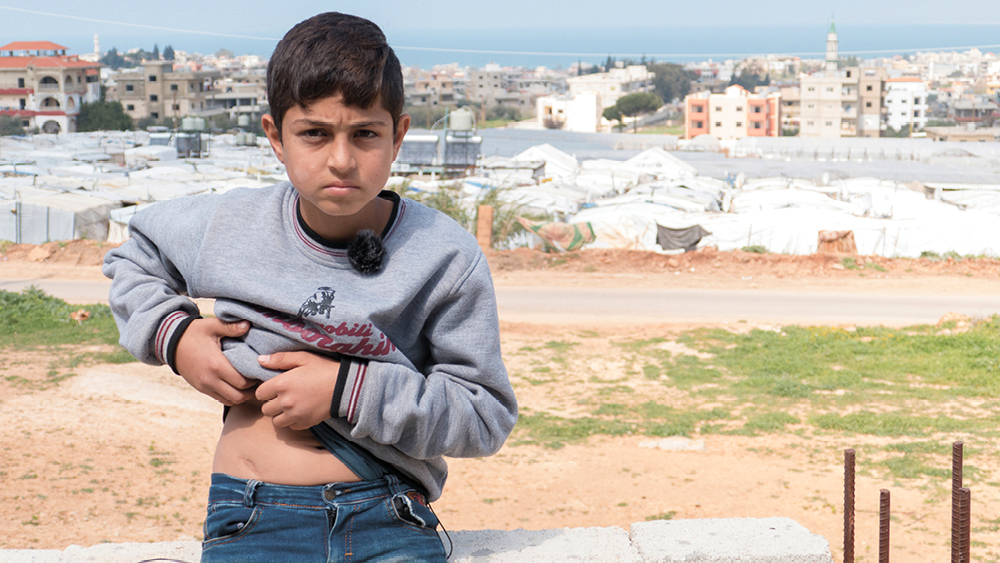The lost boys of Syria
How to help a generation of refugees schooled by the horrors of warfare
Twelve-year-old Akram sits on the floor of his tent, lost in thought. A shaft of sunlight streams in from a single window, dust dancing among the rays. Akram lets the brightness play across his fingers. Perhaps his mother is doing the same, sitting on the floor of her cell, in Syria, where she stands accused of spying.
Akram is one of the lost boys of Syria, a generation stripped of their childhood and forced to exchange a normal education for schooling in the horrors of war.
“My Dad, he died in Syria – they shot him.” – Akram, 12.
Many who made it here to this Sunni Muslim camp have fled their war-torn homes in Syria – Akram’s brother and sister among them. What’s left of their family live today in a refugee camp in northern Lebanon, which they share with 1100 others crammed into 350 tents.
There are at least 1.5 million registered refugees in Lebanon. The steady influx of the dispossessed from Syria has increased the population of this small country by as much as 50 per cent.
A cold wind from distant Mount Lebanon searches out cracks and flaps in the sturdy canvas. Beyond those snowy mountains lies Syria, and the city where Akram used to live, and where fierce fighting took place.
“My Dad, he died in Syria – they shot him,” says Akram. “My brother was fighting against the other soldiers, and they killed him too. He was 30.”
His brother’s death was Akram’s signal to leave. With his sister and younger brother, he managed to escape from Syria – but only just.
Troops took aim at their fleeing car. Shrapnel tore into Akram’s body, close to his right hip. He had to find treatment in a country where hospitals have become targets. It took doctors three hours to dig out the metal and clean the wound. He lifts his grey sweatshirt to show the scar. Those doctors did a good job. Akram was impressed.
“I want to be a doctor,” he says. “To help people.”
There’s just one problem. Akram is bright, but his schooling was cut short by war four years ago. He can neither read nor write. There are schools outside the camp that will take the younger children. They line up with their green backpacks to catch the daily bus. But that bus departs without boys like Akram.
15-year-old Abed can remember many things no child should ever have seen.
So, he joins the others of his lost generation, on wasteland overlooking the sea of tents. They chuck stones at bottles propped up on breeze blocks, and play war games. Bits of broken wood become Kalashnikovs. Captured boys are marched, hands on heads, to the stronghold, a pile of rocks. A shepherd, oblivious, cajoles his sheep along a road.
Giving these troops their orders is Fares, who’s 17 and old enough to remember what drove him out of Syria.
“It was a big fight, yes, between the Syrian army and the others. And it was terrible.”
His friend, 15-year-old Abed, can remember many things no child should ever have seen. Look into these boys’ eyes and you see a reflection of what they have been forced to behold and what they cannot forget. And there is bitterness in their words.
Abed’s eyes flicker and narrow as he tells how his uncle was captured, tortured and killed. “They made him suffer a lot. I saw a lot of people dead and suffering because of the war. It was hard for me to see all this.”
Abed’s T-shirt is black and red. His eyes have hardened into an unflinching stare: “I am asking God to punish all those people who hurt us.”
“I hope that Syria will be like before – a land of peace.” – Fares, 17.
There is nothing in this camp to dispel those terrible memories. Yet somehow the glow of home has become detached from the nightmare. These boys want to go back to Syria, even though they know their houses will be nothing but rubble. Abed’s home was blown apart by a tank.
Fares holds on to his hope – the hope of one day being able to return. “I hope that Syria will be like before – a land of peace.”
Until that day, it’s back to pelting rocks with stones and playing soldiers. And waiting for the world to change.
The Bible Societies of Lebanon and Australia are working together to give these children the chance of recovering some of their lost years of schooling. They’re drawing up plans to provide literacy training in a number of refugee camps.
Meanwhile, Akram sits in his tent, playing with the shaft of sunlight across his fingers. Four years have passed since he saw his mother. But Akram hasn’t given up on life. Although his expression often reverts to unutterable sadness, Akram is a little boy who would rather smile than cry.

